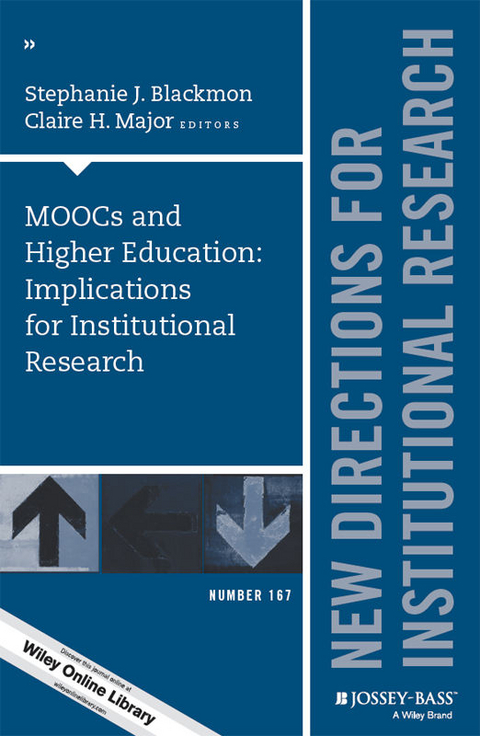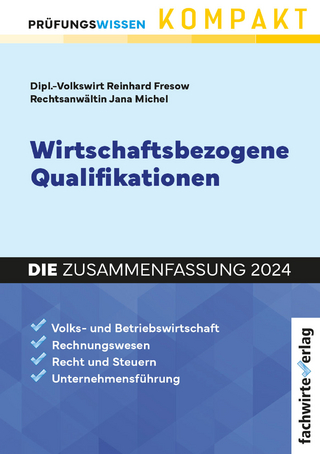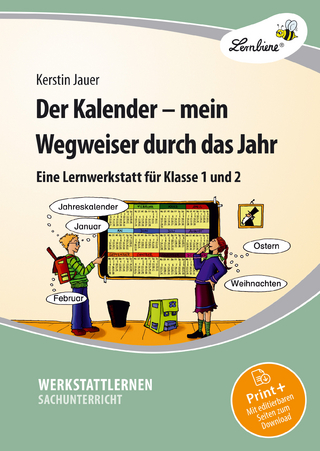
MOOCs and Higher Education: Implications for Institutional Research
John Wiley & Sons Inc (Verlag)
978-1-119-27612-8 (ISBN)
Take a broad, balanced look at the present and potential MOOC landscape in higher education. This special volume highlights current trends and issues related to the emergence and development of a new instructional form in higher education: Massively Open Online Courses (MOOCs). In these online distance education courses, enrollment is usually open to anyone who wishes to take them. This volume provides institutional researchers with information about the possibilities and challenges for current and future research on MOOCs.
Topics covered include:
- defining and classifying MOOCs and who takes them,
- defining what persistence in them means or should mean,
- describing the legal issues MOOC providers and enrollees face, and
- identifying trends in the
big data<7q>> that MOOCs can provide.
This is the 167th volume of this Jossey-Bass quarterly report series. Timely and comprehensive, New Directions for Institutional Research provides planners and administrators in all types of academic institutions with guidelines in such areas as resource coordination, information analysis, program evaluation, and institutional management.
Volume Editors: Stephanie J. Blackmon, Ph.D., is an assistant professor of higher education at The College of William & Mary. Claire H. Major, Ph.D., is a professor of higher education at The University of Alabama. Series Editor-in-Chief: John F. Ryan is director of institutional research at University of Vermont.
EDITORS' NOTES 7 Stephanie J. Blackmon, Claire H. Major 1. Massive Open Online Courses: Variations on a New Instructional Form 11 Claire H. Major, Stephanie J. Blackmon This chapter provides a detailed discussion of the term MOOC and offers a taxonomy on the ways to classify the new instructional form. 2. Massive Open Online Courses, Big Data, and Education Research 27 Sarah Eichhorn, Gary W. Matkin The implications that MOOCs have on universities, "big data," and education research are addressed in this chapter. 3. Who Takes MOOCs? 41 Chris R. Glass, Mitsue S. Shiokawa-Baklan, Andrew J. Saltarelli This chapter discusses the demographics and characteristics of MOOC learners, and also addresses the tensions associated with the present trends related to these learners. 4. Don t Forget the Fine Print: MOOCs and Student Privacy 57 Neal H. Hutchens, Azalea Hulbert The rights of MOOC users, student privacy, and the connections, or lack thereof, between MOOCs and institutional missions are discussed in this chapter. 5. MOOCs and Persistence: Definitions and Predictors 69 Brent J. Evans, Rachel B. Baker Alternative ways of understanding persistence in MOOCs and various research measures for results related to MOOCs are addressed in this chapter. 6. Through the MOOCing Glass: Professors Perspectives on the Future of MOOCs in Higher Education 87 Stephanie J. Blackmon The future of MOOCs from the perspectives of faculty members who teach/taught and developed MOOCs is discussed in this chapter. INDEX 103
| Erscheinungsdatum | 05.07.2016 |
|---|---|
| Reihe/Serie | J-B IR Single Issue Institutional Research |
| Zusatzinfo | black & white illustrations |
| Verlagsort | New York |
| Sprache | englisch |
| Maße | 154 x 228 mm |
| Gewicht | 178 g |
| Themenwelt | Schulbuch / Wörterbuch ► Unterrichtsvorbereitung ► Unterrichts-Handreichungen |
| Sozialwissenschaften ► Pädagogik ► Erwachsenenbildung | |
| ISBN-10 | 1-119-27612-8 / 1119276128 |
| ISBN-13 | 978-1-119-27612-8 / 9781119276128 |
| Zustand | Neuware |
| Haben Sie eine Frage zum Produkt? |
aus dem Bereich


